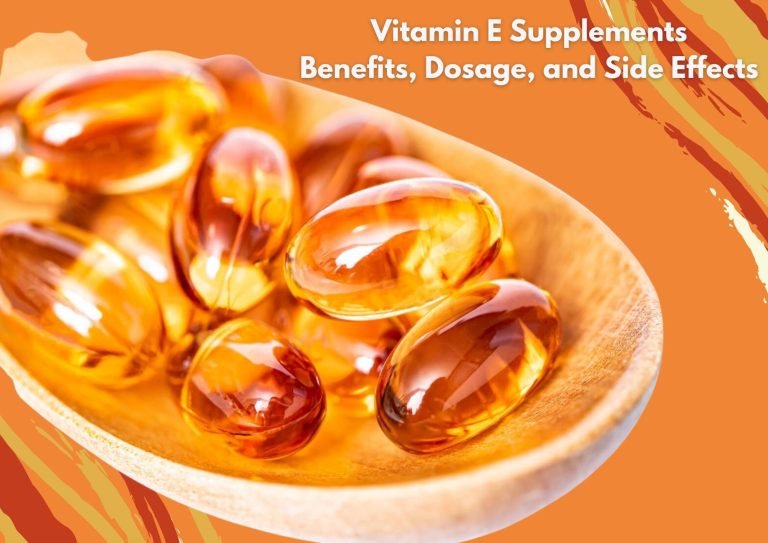 Guide to Vitamin E Supplements-Benefits, Dosage, and Side Effects
Guide to Vitamin E Supplements-Benefits, Dosage, and Side Effects
Vitamin E, an essential nutrient, is necessary for many of the body’s processes, and while it can be found in many foods, taking a vitamin E supplement can also be beneficial. This post will explore the benefits of vitamin E supplements, the recommended daily intake, and the possible side effects of taking a vitamin E supplement, leaving you with a better understanding of vitamin E and its health benefits.
Benefits of Vitamin E Supplements
Vitamin E is a crucial antioxidant that has a significant role in maintaining healthy skin, hair and nails. Apart from this, it has been linked to better heart health, improved immune system support, enhanced vision and reduction in inflammation, along with slowing down the age-related memory decline. Whether you prefer vitamin E supplements or opt for food sources to get your daily dose of this essential nutrient, having an understanding of the benefits it offers can help you make the best decision for your health.
Vitamin E aids in protecting against cell damage and environmental toxins, which makes it a crucial nutrient for healthy skin. Furthermore, it helps in reducing inflammation that can ease symptoms of arthritis, asthma and other inflammatory conditions. There is also evidence to suggest that vitamin E may enhance wound healing time whilst helping reduce the risk of diabetes by regulating blood sugar levels in those with pre-diabetic conditions.
While Vitamin E can provide several therapeutic health effects when taken adequately, there are some risks associated with taking too much tocopheryl acetate, which is the form commonly found in supplements. Taking too much of it may increase the risk of dizziness. Long-term ingestion of high dosages can lead to toxicity, and it is crucial to understand the daily dosage requirements for vitamin E before taking any vitamins or supplements. Typically, 15mg (22.4 IU) or less per day, combined with a balanced diet rich in natural sources of Vitamin E, such as almonds, spinach, and sunflower seeds, among others, should be sufficient. Always consult with your healthcare provider before incorporating dietary supplements into your regimen.
Determining the Right Dosage for Maximum Benefits
Vitamin E is a fat-soluble vitamin with many important roles in the body, such as promoting eye and heart health and functioning as an antioxidant to maintain healthy cells. To maximize benefits and avoid potential side effects of Vitamin E supplements, understanding the correct dosage is crucial. The recommended daily allowance (RDA) for adults over 19 years old is 15 mg alpha tocopherol (22.4 IU) per day. The Tolerable Upper Intake Level (UL) is 1000 mg alpha tocopherol (1500 IU) per day for adults over 19 years old, exceeding which may result in serious health risks.
When determining the proper Vitamin E supplement dosage, individual needs such as age, gender, lifestyle habits, and medical conditions should be considered. For those with fat absorption disorders, the normal adult dose is 100 mg/kg or 5-10 grams alpha-tocopherol per day, taken orally under medical supervision only.
Food sources that are high in Vitamin E include wheat germ oil, sunflower seeds, almonds, hazelnuts, peanut butter, and spinach. In summary, determining the appropriate dosage for maximum benefits when taking supplements like Vitamin E requires careful consideration based on individual needs and dietary choices.
Recommended Daily Intake for Vitamin E
Vitamin E is an essential nutrient for maintaining a healthy lifestyle. It can be found in various food sources such as wheat germ oil, sunflower seeds, almonds, and spinach. According to the National Institutes of Health (NIH), adults should consume 15 mg of Vitamin E per day. However, people with diagnosed Vitamin E deficiencies may require up to 75 mg daily dosage provided from supplements. It is important to discuss larger dosages with your doctor in advance to avoid any potential side effects.
犀利士
itamin E” src=”https://myleadblog.com/wp-content/uploads/2023/05/Recommended-Daily-Intake-for-Vitamin-E-1024×724.jpg” alt=”Recommended Daily Intake for Vitamin E” width=”749″ height=”530″ />
The usual adult dose for Vitamin E Deficiency Abetalipoproteinemia is approximately 100 mg/kg or 5 to 10 grams alpha-tocopherol per day. However, the Tolerable Upper Intake Level (UL) for Vitamin E is 1000 mg alpha-tocopherol (1500 IU). This means that you should not take more than 1000mg of vitamin e per day unless advised by your doctor.
Taking too much Vitamin E can lead to common side effects such as nausea, fatigue, headache, weakness, blurred vision, and rash. It’s important not to exceed recommended dosage levels when supplementing with vitamin e oil capsules. Also, make sure to check for any interactions between your prescribed drugs/supplements and vitamin e before consuming them together to avoid any adverse reactions or side effects.
Overall, taking the recommended daily intake of vitamin e via dietary sources or through a supplement can help protect against many health problems while providing essential nutrients needed by our bodies on a daily basis.
Possible Side Effects Of Taking Vitamin E Supplements
Vitamin E is an essential nutrient that plays an important role in maintaining good health. It is found in many foods such as vegetable oils, nuts, and green leafy vegetables. Vitamin E supplements are available for those who cannot get enough of this nutrient from their diet or those who want to get extra benefits from taking it. However, it is important to understand the possible side effects and drug interactions before taking any supplement.

Vitamin E is a fat-soluble antioxidant that helps protect cells from damage caused by free radicals and other environmental toxins. It has been linked to a number of health benefits including improved heart health, vision protection, and reduced risk of cancer.
Taking vitamin E supplements can help your body absorb more nutrients than you would get through food alone. The recommended daily allowance (RDA) for adults aged 19+ years old is 15mg per day while children aged 4-8 years old should only take 5mg per day. However, it’s best to check with your doctor before starting any supplement regimen, especially if you are pregnant or nursing, since the upper limits vary according to age group and overall health status (elderly people should not exceed 10 mg/day).
Taking vitamin E supplements can cause nausea, headache, bleeding easily due to thinning blood effect which could be dangerous if already suffering from bleeding disorders, fatigue, loss of appetite, diarrhea, abdominal pain, dizziness all these symptoms although rare but still possible depending on individual’s sensitivity levels towards this supplement. It also comes with some possible drug interactions, so it’s best practice to never mix any medication without consulting your physician first because it might interact dangerously with other drugs.
Also Read Shopee Seller Center-A Beginner’s Guide
To Summarize
Vitamin E is an essential nutrient for maintaining a healthy lifestyle. Vitamin E has many benefits including promoting eye and heart health, functioning as an antioxidant to maintain healthy cells, reducing inflammation from conditions like arthritis or asthma, aiding wound healing time, and reducing the risk of diabetes. Ultimately, understanding the correct dosage requirements and possible side effects of Vitamin E supplements will help ensure you are getting maximum benefits while avoiding potential risks associated with taking excessive amounts. If you’re considering adding a vitamin E supplement into your daily regimen, it’s important to s犀利士
peak with your doctor first in order to ensure it’s right for you.



 Guide to Vitamin E Supplements-Benefits, Dosage, and Side Effects
Guide to Vitamin E Supplements-Benefits, Dosage, and Side Effects